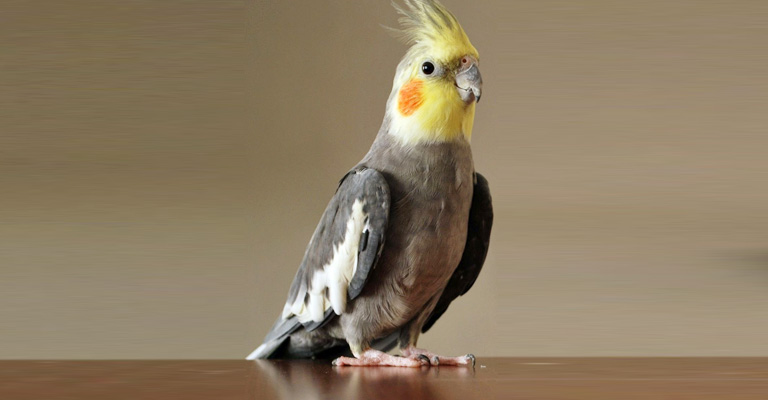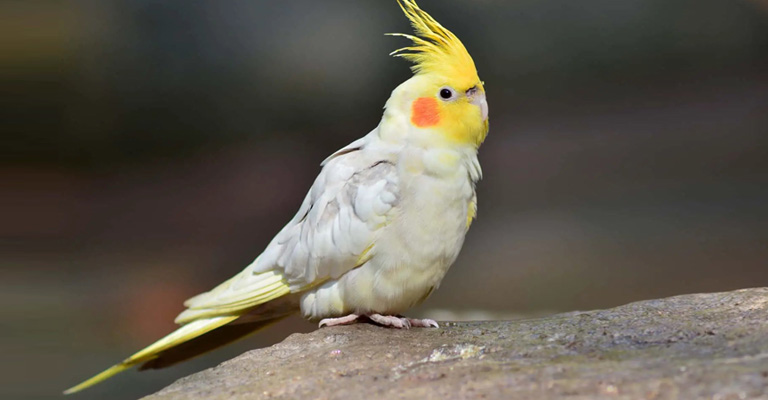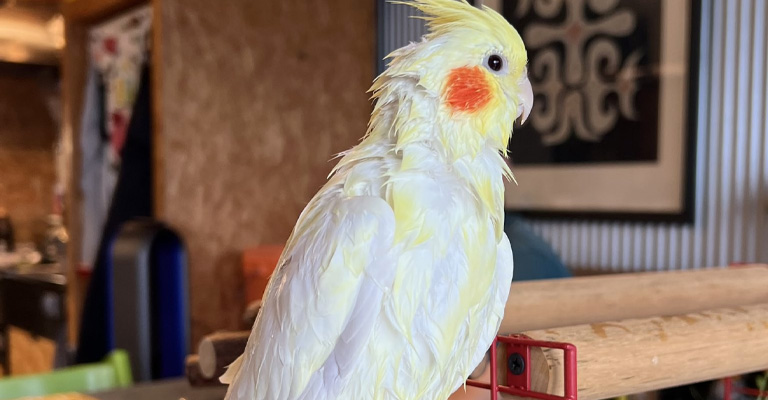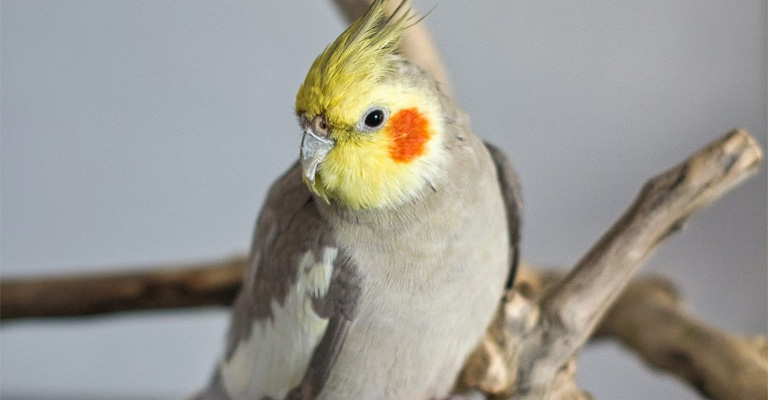Cockatiels, those charming and sociable parrots with their distinctive crests, have become beloved companions to countless households around the world.
One of the most common questions aspiring and current cockatiel owners often ask is, “How long do cockatiels live?” Understanding the lifespan of these feathered friends is not just a matter of curiosity but a crucial aspect of responsible pet ownership.
The answer to this query is multifaceted, influenced by a variety of factors that span from genetics to environmental conditions and quality of care.
In this exploration, we will delve into the factors that determine the lifespan of cockatiels, compare the lifespans of wild and pet cockatiels, and offer insights into how to maximize their longevity.
So, whether you are already sharing your home with a cockatiel or are considering adopting one, read on to discover how to provide the best possible care for your feathered companion.

Overview of Cockatiel Lifespan
Cockatiels (Nymphicus hollandicus) are small, popular pet birds known for their charming personalities and distinctive crests. They belong to the parrot family and are native to Australia.
Understanding their lifespan is essential for those considering keeping them as pets. Here’s an overview of the cockatiel’s lifespan:
Wild Cockatiels Lifespan
Wild cockatiels have a relatively shorter lifespan compared to their captive counterparts. In their natural habitat, they face various threats, including predators, food scarcity, and environmental factors. As a result, the average lifespan of a wild cockatiel is typically around 10 to 15 years.
Captive Cockatiels Lifespan
Cockatiels that are kept as pets in captivity tend to have longer lifespans due to the controlled environment and proper care they receive.
The average lifespan of a well-cared-for captive cockatiel is typically between 15 and 20 years. However, some cockatiels have been known to live even longer, reaching their late 20s or early 30s with exceptional care.
Factors Affecting Cockatiel Lifespan
Several factors can influence the lifespan of a captive cockatiel:
- Diet: Providing a balanced diet with fresh fruits, vegetables, seeds, and pellets is crucial for their health and longevity.
- Cage and Environment: A clean, spacious cage with plenty of toys, perches, and mental stimulation can contribute to a longer and healthier life.
- Healthcare: Regular veterinary check-ups and prompt treatment of any health issues are essential.
- Social Interaction: Cockatiels are social birds that thrive on interaction and companionship. Loneliness and boredom can negatively impact their well-being.
- Exercise: Regular exercise is important to maintain their physical and mental health.
- Genetics: Some cockatiels may have genetic predispositions to certain health issues, which can affect their lifespan.
Common Health Issues
Cockatiels are susceptible to various health problems, including respiratory infections, obesity, fatty liver disease, and feather plucking. Regular health monitoring and a healthy lifestyle can help mitigate these risks.
Quality of Care
The overall quality of care provided by their owners is a significant factor in determining a cockatiel’s lifespan. Responsible ownership, proper nutrition, and attention to their well-being play crucial roles.
Cockatiels can live a relatively long and healthy life when kept in captivity with proper care, nutrition, and attention to their well-being. A well-cared-for cockatiel can provide companionship and joy to its owner for many years, sometimes even reaching their third decade of life.
How Long Do Cockatiels Live?

Cockatiels, like many other animals, can exhibit some variations in lifespan depending on factors such as genetics, diet, care, and living conditions. While the average lifespan of a well-cared-for captive cockatiel is generally between 15 and 20 years, the specific type or mutation of the cockatiel can also play a role in its longevity.
Here’s a breakdown of how different types of cockatiels may vary in terms of lifespan:
Normal Gray Cockatiels
Normal gray cockatiels are the most common type and have the wild-type coloration. On average, these cockatiels can live anywhere from 15 to 20 years with proper care.
Lutino Cockatiels
Lutino cockatiels are known for their striking yellow plumage and red eyes. They have a similar average lifespan to normal gray cockatiels, typically living 15 to 20 years when well taken care of.
Pearl Cockatiels
Pearl cockatiels have unique feather patterns with “pearl-like” spots on their wings and back. They can also live an average of 15 to 20 years when provided with good care.
Cinnamon Cockatiels
Cinnamon cockatiels have a warm, cinnamon-brown hue to their feathers. Their lifespan is generally consistent with other common cockatiel types, ranging from 15 to 20 years.
White-Faced Cockatiels
White-faced cockatiels lack the typical yellow and orange facial coloration seen in other varieties. They have the same average lifespan of 15 to 20 years with proper care.
Pied Cockatiels
Pied cockatiels have patches of white or light-colored feathers mixed with their regular plumage. Their lifespan is typically in the same range as other cockatiels, around 15 to 20 years.
Albino Cockatiels
Albino cockatiels are completely white with red eyes, and they are essentially lutino birds with different coloration patterns. They share the same average lifespan of 15 to 20 years when provided with proper care.
Rare Mutations and Color Varieties
Some rare mutations and color varieties, such as the pastel face, silver, or emerald mutations, may have a similar lifespan to the common types, but information about their lifespans can be limited due to their rarity.
It’s important to note that while these are average lifespan ranges for different types of cockatiels, individual variation can occur. Factors such as genetics, diet, healthcare, and the bird’s environment play significant roles in determining how long a cockatiel will live.
Providing a loving, well-maintained home with regular veterinary care and a balanced diet will contribute to a healthy and fulfilling life for your pet cockatiel, regardless of its color or mutation.
Factors Affecting Cockatiel Lifespan

The lifespan of a cockatiel, like any living creature, can be influenced by a variety of factors. Proper care and attention to these factors can help ensure a longer and healthier life for your pet. Here are the key factors that can affect a cockatiel’s lifespan:
Diet and Nutrition
Providing a balanced and nutritious diet is crucial for a cockatiel’s health and longevity. Their diet should include a mix of high-quality pellets, fresh fruits, vegetables, and occasional seeds as treats. Avoid feeding them foods that are toxic to birds, such as chocolate and avocados.
Cage and Environment
A clean and appropriately sized cage is essential. Cockatiels need enough space to move, stretch their wings, and play. Regular cleaning of the cage and providing clean water and fresh food daily helps prevent illness.
Social Interaction and Mental Stimulation
Cockatiels are highly social birds and need regular interaction with their human caregivers or other birds. Loneliness and boredom can lead to stress and health issues. Providing toys, puzzles, and activities can help keep them mentally and physically engaged.
Healthcare and Veterinary Care
Regular check-ups with an avian veterinarian are essential. Cockatiels are prone to various health issues, including respiratory infections, mites, and feather problems. Prompt medical attention can make a significant difference in their overall health and lifespan.
Exercise
Cockatiels require regular exercise to stay healthy. Allowing them out of the cage to fly and explore in a safe environment is crucial. Flight is not only exercise but also provides mental stimulation and helps prevent obesity.
Avoiding Toxins
Keep your cockatiel away from harmful substances and toxins in the environment. This includes avoiding exposure to fumes from cleaning products, smoke, and other household chemicals.
Temperature and Climate
Cockatiels are sensitive to temperature extremes. Ensure they are kept in a comfortable environment with a stable temperature range. Avoid drafts, extreme heat, and cold.
Genetics
Some cockatiels may have genetic predispositions to certain health issues. While you can’t control their genetics, you can minimize the impact of these factors with proper care.
Quarantine and Disease Prevention
When introducing a new bird to your household, it’s essential to quarantine them initially to prevent the spread of potential diseases. Regularly clean and disinfect their living area to minimize the risk of disease transmission.
Stress Reduction
Minimize stress in your cockatiel’s life by avoiding sudden changes in their environment, routines, or companions. Cockatiels are sensitive to stress, which can weaken their immune system and affect their overall health.
Socialization with Other Birds
While cockatiels are known to be social, introducing them to other birds should be done carefully. Compatibility should be considered, and they should be monitored for any aggressive behavior.
By paying attention to these factors and providing a loving and attentive environment, you can help ensure that your cockatiel lives a long and healthy life, potentially reaching the upper end of its average lifespan, which is around 15 to 20 years when well cared for.
Healthy Living for Cockatiels

Maintaining a healthy lifestyle for your cockatiel is essential to ensure their well-being and longevity. Here are some key aspects of healthy living for cockatiels:
Balanced Diet
Provide a well-balanced diet that includes high-quality cockatiel pellets as the main food source. Supplement their diet with fresh fruits and vegetables like apples, carrots, broccoli, and leafy greens. Offer treats like millet sprays or seeds in moderation.
Clean and Fresh Water
Ensure that your cockatiel always has access to clean and fresh water. Change the water daily and clean the water dish to prevent the growth of harmful bacteria.
Exercise and Mental Stimulation
Allow your cockatiel regular out-of-cage time for exercise and mental stimulation. Provide a safe and bird-proofed area for them to explore, climb, and fly. Offer toys, puzzles, and objects that encourage problem-solving and play.
Social Interaction
Cockatiels are social birds and thrive on interaction with their human caregivers. Spend time with your cockatiel daily, talking to them, offering head scratches, and engaging in play. If possible, consider getting a second cockatiel as a companion to prevent loneliness.
Proper Cage and Environment
Ensure that the cage is appropriately sized, clean, and safe. Include perches of different sizes and materials to encourage foot health. Place the cage in a draft-free area, away from direct sunlight and temperature extremes.
Regular Veterinary Care
Schedule regular check-ups with an avian veterinarian. Annual wellness exams can help detect and address health issues early. Keep a record of your cockatiel’s weight and appearance to monitor changes.
Grooming
Cockatiels need regular grooming, including nail trims and, occasionally, beak trims. Consult your veterinarian or an experienced avian groomer for these procedures.
Toxin-Free Environment
Keep your home free from harmful substances and toxins, including tobacco smoke, aerosol sprays, and household cleaning products. These can adversely affect your cockatiel’s respiratory system.
Safe Toys and Accessories
Ensure that the toys and accessories in your cockatiel’s cage are safe and free of small parts that could be ingested or pose choking hazards. Rotate and introduce new toys regularly to prevent boredom.
Regular Cleanliness
Maintain a clean living environment for your cockatiel. Clean the cage and accessories regularly to prevent the buildup of waste and bacteria. Provide a clean and dry substrate material at the bottom of the cage.
Disease Prevention
Quarantine new birds before introducing them to existing flock members to prevent the spread of diseases. Be cautious about exposure to other birds and wild birds, as they can transmit diseases.
Observation and Monitoring
Pay close attention to your cockatiel’s behavior, appearance, and eating habits. Any changes in behavior or signs of illness, such as lethargy, changes in droppings, or respiratory issues, should prompt a visit to the veterinarian.
By following these guidelines for healthy living, you can help ensure that your cockatiel enjoys a happy and fulfilling life and has the best chance of reaching its potential lifespan of 15 to 20 years or more.
Signs of an Aging Cockatiel
As cockatiels age, they may go through various physical and behavioral changes that are indicative of the aging process. It’s important to be aware of these signs so you can provide appropriate care and attention to your senior cockatiel. Here are eight signs of an aging cockatiel:
Decreased Activity and Energy Levels
Aging cockatiels often become less active and energetic. They may spend more time resting or perched quietly in their cage. While some decrease in activity is normal, excessive lethargy could be a sign of an underlying health issue.
Changes in Feather Condition
Older cockatiels may develop changes in their feather quality and appearance. Feathers may become duller or may show signs of wear and tear. Proper grooming and a balanced diet can help maintain feather health.
Changes in Vocalization
Cockatiels are known for their vocalizations, but aging birds may produce fewer or different vocalizations. They might become quieter or produce less complex sounds. Pay attention to any unusual vocal changes that could indicate discomfort or illness.
Decreased Appetite
Senior cockatiels may experience a reduced appetite. Changes in diet preferences or weight loss can be indicators of aging-related issues or underlying health problems. Offer a variety of fresh and appealing foods to entice them to eat.
Dental and Beak Issues
Over time, a cockatiel’s beak can grow unevenly or develop abnormalities. Dental problems can also occur. Regular beak and nail trims may be necessary to help your aging cockatiel eat comfortably.
Joint Problems and Mobility Issues
Arthritis and joint issues can affect older cockatiels, leading to decreased mobility and difficulty perching or moving around. Providing perches and cage accessories that are gentle on their feet can help alleviate discomfort.
Changes in Sleeping Patterns
Aging cockatiels may experience changes in their sleeping patterns. They might sleep more during the day or have restless nights. Ensure that they have a quiet and comfortable sleeping area and maintain a consistent sleep schedule.
Increased Susceptibility to Health Issues
As cockatiels age, they become more susceptible to various health problems, including respiratory issues, infections, and organ-related conditions. Regular check-ups with an avian veterinarian become even more crucial to catch and address potential health concerns early.
It’s essential to provide extra care and attention to your aging cockatiel, including regular vet visits, a comfortable and safe environment, and a diet tailored to their changing needs.
Be vigilant in monitoring their health and behavior, as early detection of age-related issues or illnesses can significantly impact their quality of life in their senior years.
How to Take Care of an Aged Cockatiel?
Caring for an aged cockatiel requires special attention and adjustments to their care routine to ensure they have a comfortable and fulfilling life in their senior years. Here are some essential tips on how to take care of an aged cockatiel:
Regular Veterinary Check-ups
Senior cockatiels are more prone to health issues. Schedule regular check-ups with an avian veterinarian to monitor their overall health and address any age-related concerns or illnesses promptly.
Tailored Diet
Adjust their diet to meet their changing nutritional needs. Older cockatiels may require a diet with lower fat content to prevent obesity, yet it should still be nutritionally balanced. Consult your veterinarian for dietary recommendations.
Hydration
Ensure that your aged cockatiel has easy access to clean and fresh water at all times. Dehydration can be more problematic for senior birds.
Comfortable Cage and Accessories
Provide a comfortable and secure living environment. Make sure the cage is spacious with soft, gentle perches to ease pressure on aging joints. Provide a cozy sleeping area away from drafts and disturbances.
Grooming and Nail Care
Older cockatiels may have difficulty grooming themselves, so you may need to assist with grooming tasks like beak and nail trimming. Consult your vet or an experienced groomer for guidance on these procedures.
Physical and Mental Stimulation
Continue to provide opportunities for exercise and mental stimulation. Even if your senior cockatiel is less active, offer toys, puzzles, and interaction to keep their mind engaged.
Medication and Supplements
If your aged cockatiel has specific health issues, follow your veterinarian’s advice regarding medications and supplements. They may need medications for chronic conditions or supplements to support their aging bodies.
Temperature and Environment
Maintain a stable and comfortable temperature in their living space, as older birds are more sensitive to temperature extremes. Avoid drafts and ensure their cage is not exposed to direct sunlight.
Quiet and Calm Atmosphere
Provide a calm and quiet environment. Older cockatiels may become more easily stressed, so minimize loud noises, sudden changes, or disruptions.
Social Interaction
Continue to spend time with your aged cockatiel, as they still need social interaction and companionship. Be patient and gentle in your interactions, respecting their need for rest.
Observation and Monitoring
Pay close attention to any changes in behavior, appetite, or physical condition. Early detection of health issues can lead to more effective treatment.
Quality of Life
Continually assess your cockatiel’s quality of life. If they are suffering from severe health problems that impact their ability to enjoy life, consult with your veterinarian about humane end-of-life decisions.
Remember that each aged cockatiel is unique, and their care requirements may vary. Regular communication with your avian veterinarian is vital to ensure your pet’s specific needs are met and that they enjoy the best possible quality of life in their senior years.
FAQs
Cockatiels kept as pets generally have a lifespan of 15 to 20 years with proper care. Some can even live into their late 20s or early 30s with exceptional care and a healthy lifestyle.
Several factors affect their lifespan, including diet, environment, social interaction, healthcare, and genetics. Well-cared-for cockatiels tend to live longer.
Yes, wild cockatiels typically have a shorter lifespan, around 10 to 15 years, due to various threats in their natural habitat, while captive cockatiels enjoy a more controlled and protected environment.
The type or color mutation of a cockatiel doesn’t significantly impact its lifespan. Common and rare mutations generally share an average lifespan of 15 to 20 years with proper care.
To promote a longer life for your cockatiel, provide a balanced diet, a clean and safe environment, regular vet check-ups, social interaction, and mental stimulation. Ensuring their overall well-being is essential for a healthy and fulfilling life.
Wrapping Up
In the world of avian companions, cockatiels stand as a delightful and enduring choice. Understanding the intricacies of their lifespan is not only a testament to the commitment to responsible pet ownership but also a means to ensure that your beloved bird thrives throughout its life.
With an average lifespan of 15 to 20 years or even more with exceptional care, cockatiels offer years of companionship, joy, and personality.
By providing a balanced diet, a safe and stimulating environment, regular veterinary care, and plenty of love and attention, you can help your cockatiel live a long and fulfilling life, making them a cherished member of your household for years to come.